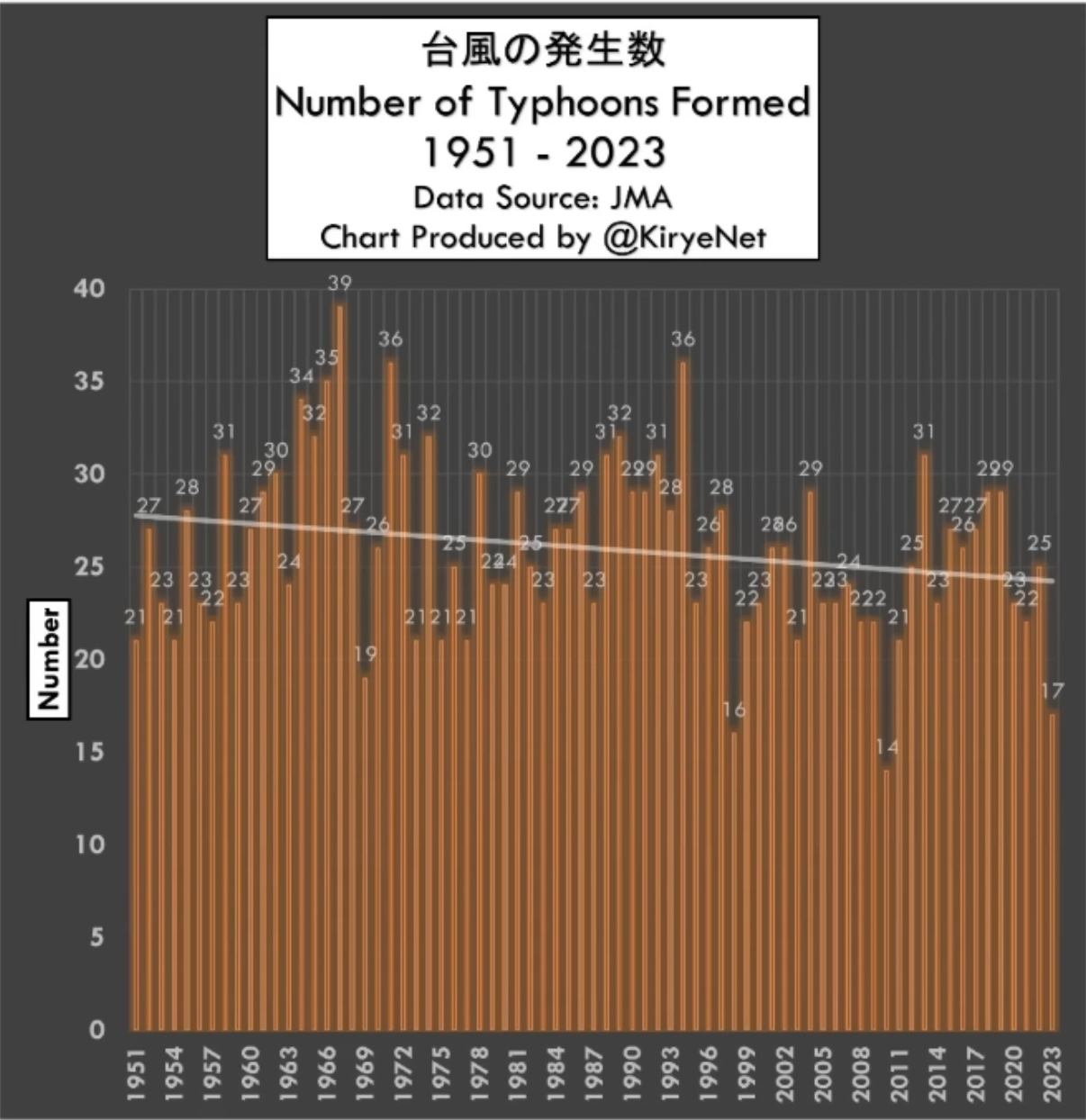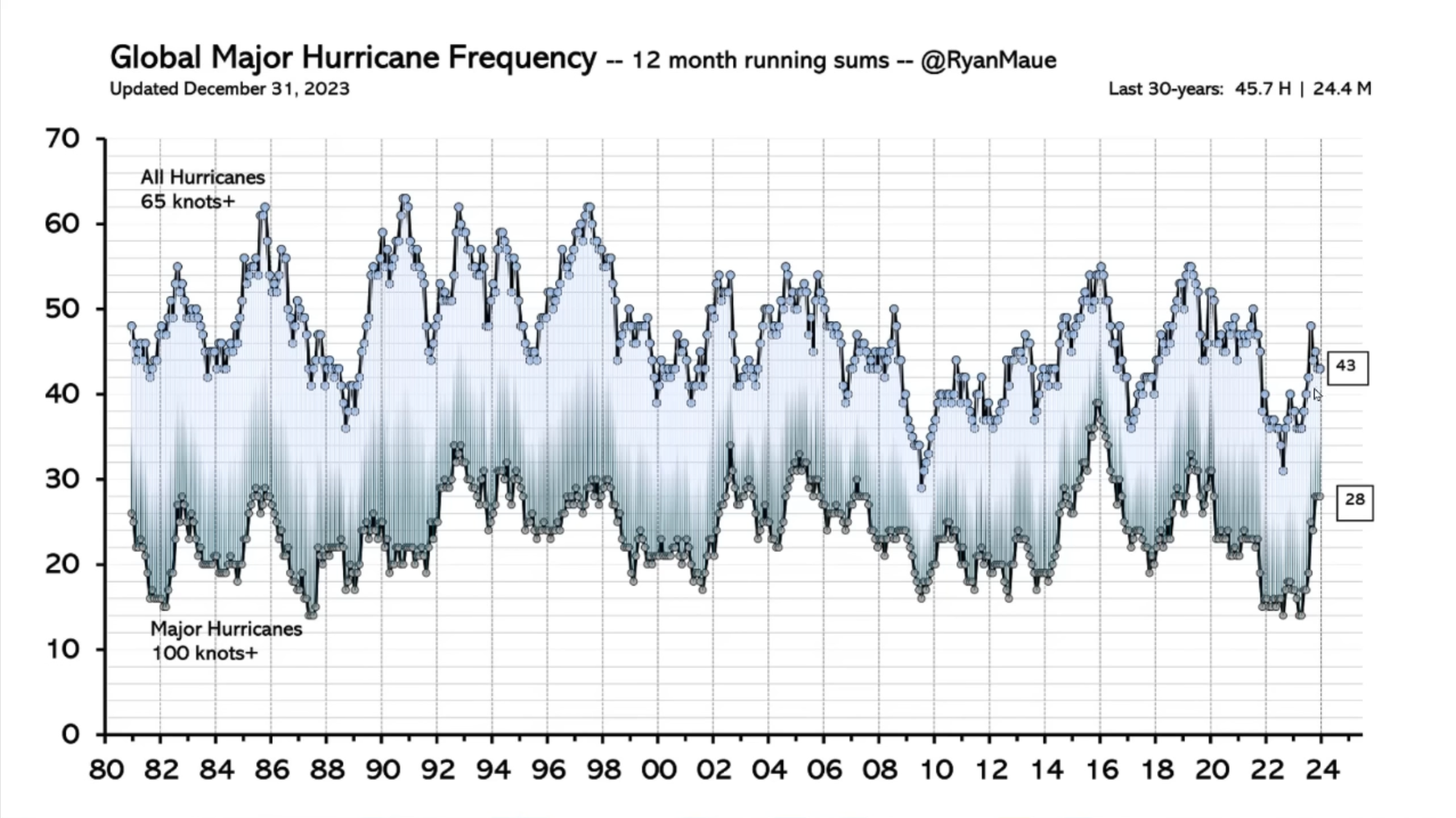

Recent data analyses on the frequency and intensity of tropical cyclones have yielded some interesting findings. An examination of Pacific typhoons since 1951 suggests a declining trend over the past 50 years.
Recent data analyses on the frequency and intensity of tropical cyclones have yielded some interesting findings. An examination of Pacific typhoons since 1951 suggests a declining trend over the past 50 years. These results are based on a graph produced using simple spreadsheet software, indicating that advanced tools are not necessarily required for basic data analysis in climate science.

Further supporting a trend of decreasing cyclone activity, a graph by Ryan Maui indicates that the global tropical accumulated cyclone energy (ACE) has been declining for the past 30 years. Additionally, data on hurricane frequency also show a downward trend over the same period. This evidence challenges the notion that global warming leads to an increase in the frequency and intensity of tropical cyclones.

A potentially significant correlation has been observed between solar activity, as measured by sunspots, and the frequency of major hurricanes. Data over the last three solar cycles show an anti-correlation: when solar activity was low, major hurricane frequency was high, and vice versa. Peer review of this correlation has confirmed its presence, suggesting that solar activity may play a role in influencing hurricane frequency, though more research is needed to establish causality.
Amazing correlation with the SILSO sunspots pic.twitter.com/3C2uWVWnqW
— Andy May (@Andy_May_Writer) January 24, 2024
The National Oceanic and Atmospheric Administration (NOAA) has posited that global warming will likely intensify hurricanes, with higher wind speeds and more precipitation. However, this theory has come under scrutiny, as current data does not appear to support these predictions. In fact, some of the hottest years on record have coincided with some of the lowest major hurricane activities, further complicating the narrative.
Media outlets have occasionally been accused of promoting an agenda, particularly when discussing the impact of fossil fuels on climate change. After Hurricane Katrina in 2005, for instance, there was speculation about the influence of global warming on hurricane intensity. However, Dr. Chris Lanzie, the chief scientist at the National Hurricane Center, provided a counterpoint suggesting that global warming might actually decrease hurricane power. The press, as critics argue, may prioritize narratives that align with certain agendas over balanced scientific discourse.
President Eisenhower's 1961 farewell speech warned about the potential for government funding to politicize science, potentially leading to a situation where public policy could become captive to a scientific-technological elite. The concern is that funding might drive research directions, particularly favoring studies that focus on carbon dioxide's relationship with climate over other factors such as solar activity.
Prominent figures within the scientific community have expressed concern about the reliability of published research. Richard Horton, editor of the Lancet journal, and the editor of the New England Journal of Medicine have both highlighted issues of conflict of interest, small sample sizes, and the pursuit of trends over substantial science. These concerns resonate with Eisenhower's warnings and suggest a need for reform in academic research practices.
The analysis of tropical cyclone data and the potential influence of solar activity on hurricane frequency raise important questions about the current understanding of climate science. While the academic community continues to conduct research, it is essential for independent verification and analysis to occur. The internet has become a platform for real-time science and discussion, offering an alternative to traditional academic channels. As climate science continues to evolve, it is crucial for the public to engage critically with the research and to distinguish between well-supported studies and those that may be influenced by funding or political agendas.